I've seen this problem with security camera blurry many times in my career, and people are usually looking for a solution but can't figure out what is going on.
There are different scenarios and causes of the problem, sometimes it happens during the day and sometimes people have security camera blurry at night.

Anyway, it doesn't matter which problem you are facing, in this article, I discuss in details how to fix the security camera blurry issue during the day or at night.
What causes the security camera blurry?
Ohhh boy, I could be rich if got $1 per answer since I started working with security cameras 15+ years ago. The questions come from different people that have analog or IP cameras installed in different scenarios.
Some people ask me "how to fix the CCTV camera blurred night" others refers to them as security cameras, but the fact is that all of the problems are related to simple physics related to light, lenses or shutter speed adjustment.
Don't worry if you are not a CCTV camera professional and just want to fix your problem, bare with me for a while, read through this article and you will certainly find the best solution for your case. Just be patient and keep reading...
Security camera blurry during the day
The first thing you can consider if your security camera is blurry during the day is the focus. If the camera lens doesn't concentrate the light into the right spot of the camera image sensor, the result is a blurry (out of focus) image.
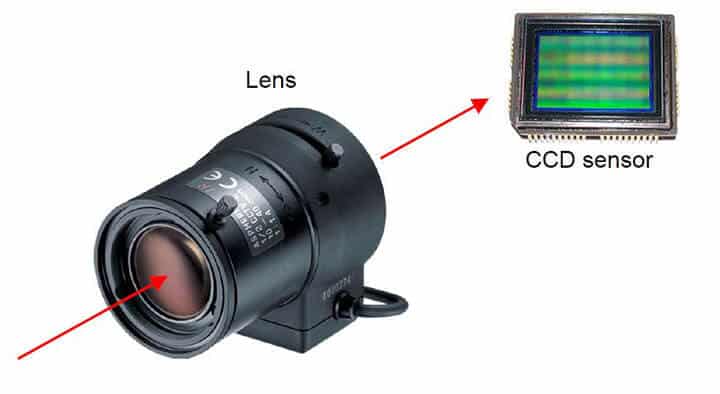
There are different types of lenses for security cameras, but the principle is the same for all of them. Rays of light come to the lens and are directed to the camera sensor and it must converge in the correct point otherwise the image gets blurry.
The image below shows the focal point where the light might convert to.
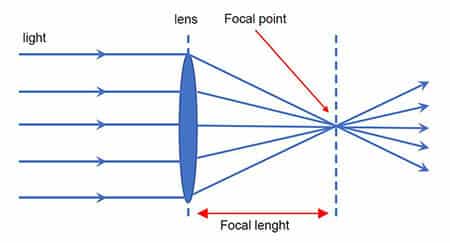
Camera with varifocal lens
If your security camera has a varifocal lens, just adjust the focus by turning the screw in the lens until you get the image the way you want.
The image below shows a varifocal lens with a screw for focus control.
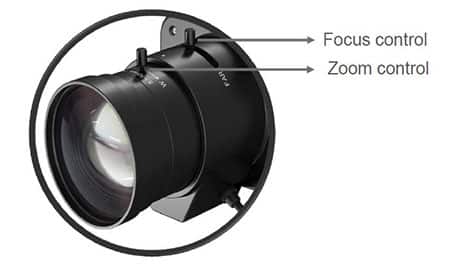
Due to the fact that a varifocal lens allows adjusting the optical zoom, there's also a focus control since the camera zoom in or out changes the focal length.
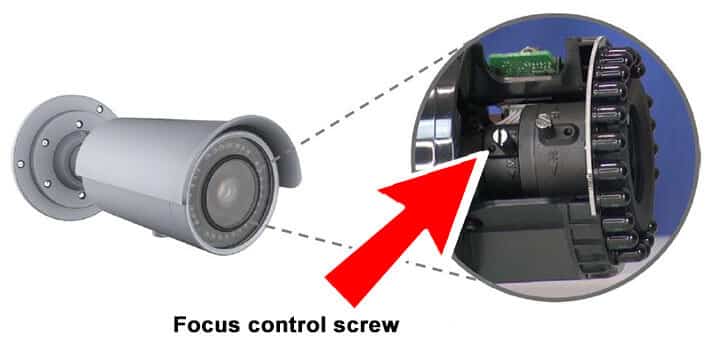
Camera with fixed lens
In a security camera with a fixed lens, it's not possible to adjust the optical zoom, so there's no need for focus adjustment since the camera comes from the factory with the lens adjusted to the correct distance from the camera image sensor.
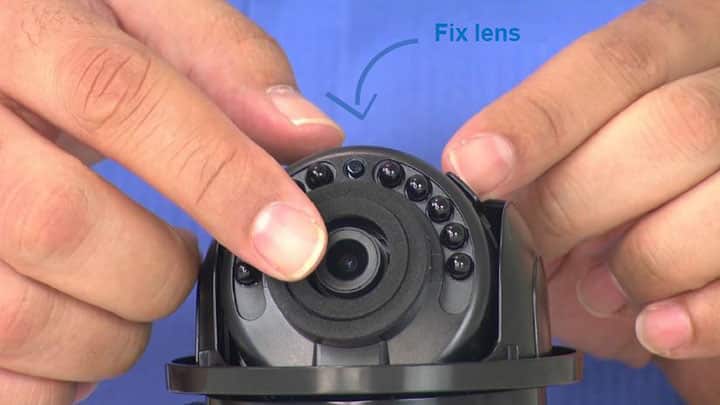
But, sometimes bad things happen. Let's say the lens was forced out of the original position and the distance between the fixed lens and the camera image sensor is not correct anymore, this can cause the blurry image.
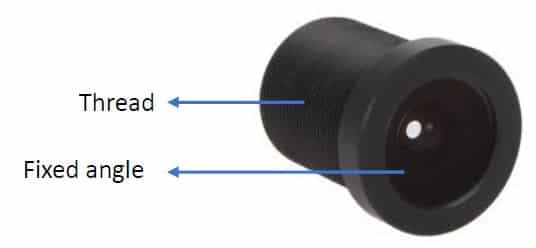
You can try to adjust the focus by turning the fixed lens clockwise until reaching the position that is going to have the correct focus if that's is the real problem.
Warning: Usually the fixed lens comes adjusted to the right position, is not usual to have this kind of problem, so be really careful to try this procedure.
Besides the fact that this problem happens in rare situations, I've seen it happen with low-cost cameras (models manufactured in China).
Depth of field
Another problem with security camera blurry image is the miss interpretation of the camera setup related to the depth of view (how deep the camera focus is).
Take a look at the image below and you will understand what I mean...

Can you see that the pole is in focus while the rest of the scenario is not ?
People usually say the camera is blurry because part of the image is blurry as you can see in the cars. but this is not a problem, it's a setup for this application.
It's possible to have this type of situation by controlling the lens aperture and the depth of field. In fact, this is a technique used by photographers and filmmakers to get the attention to something in the picture or movie.
The picture below is an example of the depth of view control, where the bird is in focus but what is behind it it's not. This is done by open up the camera lens.

With your CCTV camera is the same, depending on the lens aperture you can achieve more or less are in focus. For most security camera applications, the more object in focus, the better, so a large depth field o view is desired.
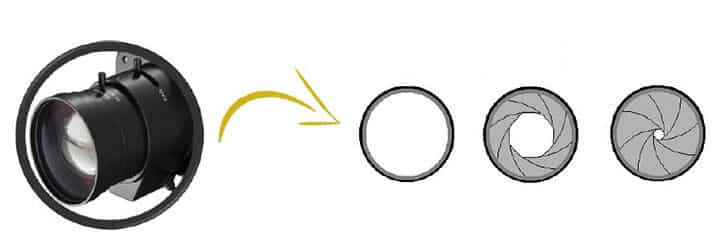
From left to right more depth of view is acquired. When the lens is wide open (left) there's a shallow depth of view (just like the picture of the bird). But when the lens aperture is minimal (right) there's a deep field of view, which means everything is the scene is in focus. See the picture below as an example.

So, if you want to have your security camera with everything in the scene in focus just like the picture above keep the lens with a minimum aperture.
You can find this information in the camera as the F-number, just adjust it to open up and down the lens aperture (I'm not getting in the details here).
==> Just in case you are interested in learning more about this subject, read the pages 58 to 72 from the Ultimate Security Camera Guide (this is a guide for professional CCTV designers and installers).
Warning: Be careful with this configuration since it reduces the amount of light that comes into the camera and the image gets darker.
Security camera blurry during the night
The lens aperture
I bet your security camera shows a clear image during the day but a blurry image at night and this is making you crazy, right ? Don't worry, you can fix that.
Now that you read everything in this article, you have the necessary knowledge to understand what is going on with your security camera, don't you?
Remember the lens aperture concept related to the depth of field, if the lens is wide open there's a shallow depth of view, which means part of the image is blurry.
During the day the lens aperture is minimum to avoid too much light coming into the camera image sensor. This is done automatically by the camera.
At night, when the sun goes down, what the security camera does?
I bet you got that right... the security camera automatically increases the lens aperture to get more light and with a wider lens aperture comes the blurry image.
What you have to do is adjusting the camera F-number to work with the minimum lens aperture, so you can have a deep depth of field and keep everything in focus.
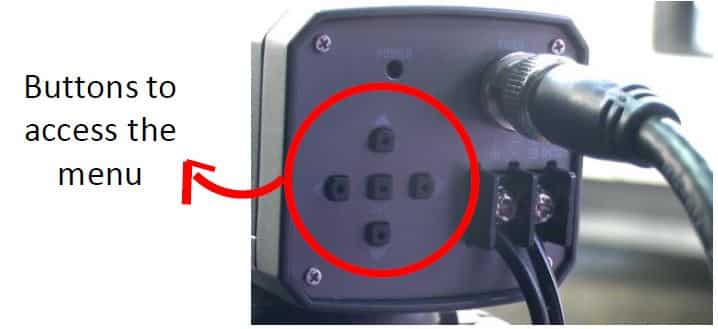
On analog cameras, you can use the buttons to have access to the OSD menu (depending on the camera model). On IP cameras you can access the menu via a web browser. Unfortunately, some cheap cameras don't have this option.
The security camera back focus
Some old security cameras have a back focus screw that allows you to move the sensor position, so you are basically changing the point where the rays of the light converge to. This allows adjusting the problem with the blurry image during the night.
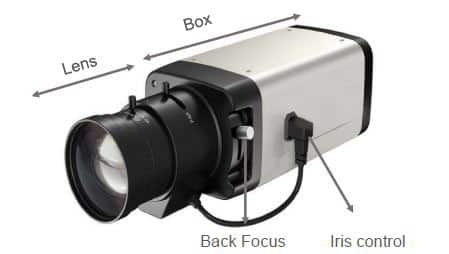
The back focus screw is also available for dome and bullet cameras.
The Infrared cut removal
Another common issue with security camera blurry at night is related to the infrared light, during the day there's a lot of light coming from the sun and some security camera uses a filter to block the infrared light, so the camera image sensor doesn't get excessive and unnecessary light.
At night this filter (a piece of glass) is automatically removed by the camera, so more light can come into the image sensor to have a better image with low illumination with greater light sensitivity in monochrome mode
This technology is called ICR (Infrared Cut Filter Removal) and is available in the best security cameras (unfortunately cheap cameras don't have it).
The blurry image shows up when the lens is not good enough to correct the light refraction since the filter is not in front of the lens anymore there's "less glass" the light might coming through thus changing the focal point in the image sensor.
So, the lens MUST be able to correct the issue with this changing of "glass thickness" to avoid the blurry problem.
The bottom line
As you can see there's no simple direct answer to the question "How to fix security camera blurry" but now you have a better idea what could be the problem related to your particular situation.
I suggest you read the article carefully and try to solve the problem you are facing. You might also take a look at your security camera specs to see if you can see information related to the ICR, F-number, Type of lens, Back Focus, etc.
If you want to learn even more about security cameras, I recommend you to take a look at the Ultimate Security Guide Collection. See the links below:
Please share this information with your friends...
